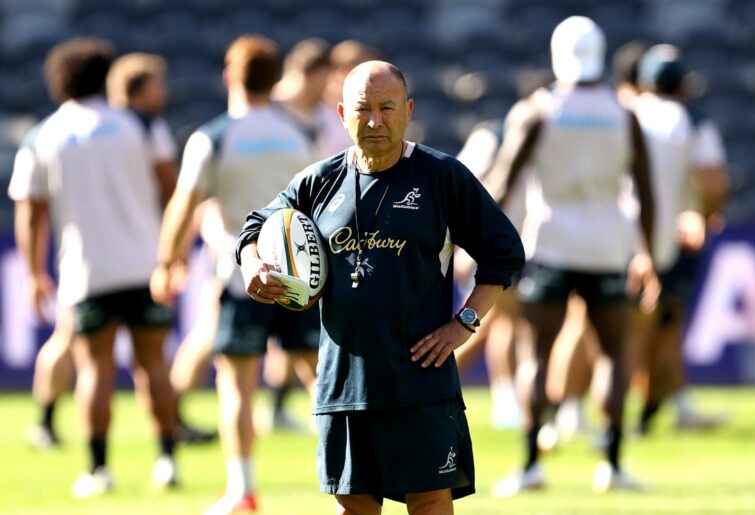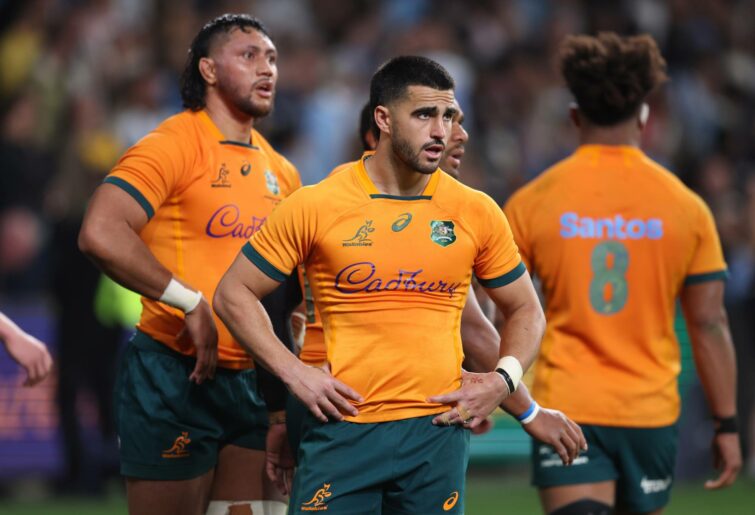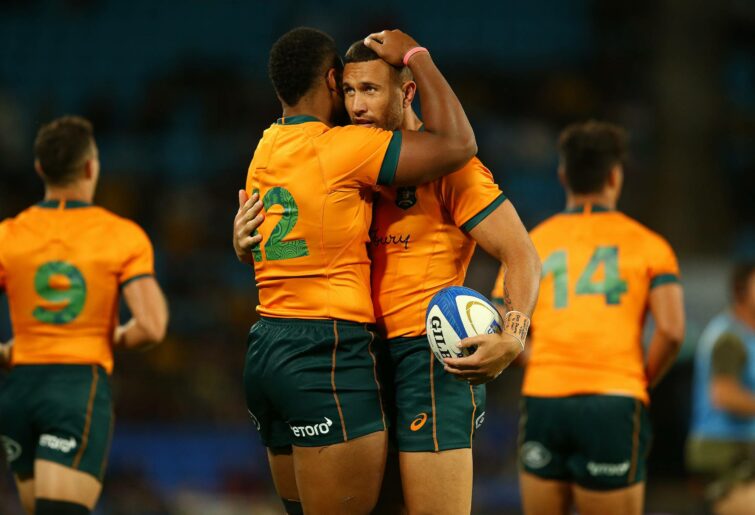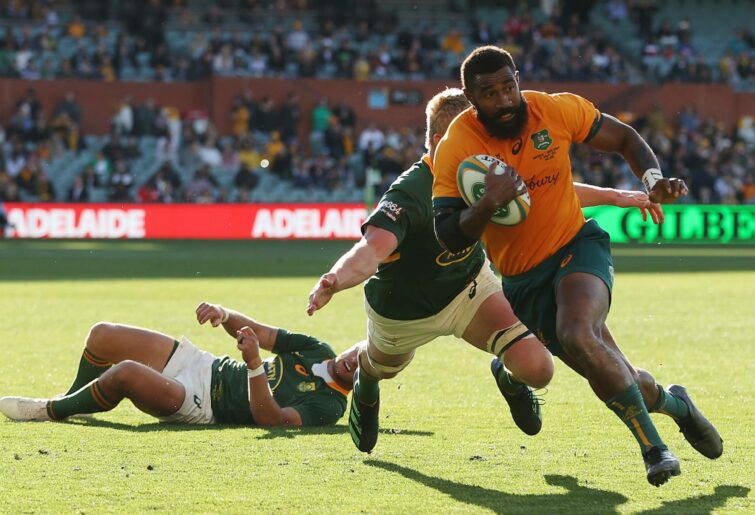Since the turn of the century, Australian rugby fans have learned the hard way, not to get ahead of themselves.
That’s a result of the same cycle repeating itself over and over: each World Cup failure or Bledisloe Cup loss bringing periods of dark self-loathing, interspersed with occasional rays of light, off the back of an occasional unexpected win (47-26 over the All Blacks in Perth, in 2019) or a change of coach.
As always, media plays a role in reinforcing that roller coaster ride, pumping up every new coach with the jibber-jabber expectation of an eight-year-old kid on Christmas Eve.
That is, until a slew of disappointing results opens the door to question marks and destabilisation, the wheel turns, and the story becomes the execution of the guilty, the chase for a successor, and coronation of the new hero.
Having already coached the Wallabies to a World Cup final in 2003, Eddie Jones has duly been painted as the second coming. But despite all of Jones’ experience and rugby nous, once the emotion is stripped away, and hope introduced to reality, it isn’t hard to find reasons why the Wallabies will be returning from France empty-handed.

Wallabies coach, Eddie Jones looks on during an Australia Wallabies Captain’s Run at CommBank Stadium on July 14, 2023 in Sydney, Australia. (Photo by Brendon Thorne/Getty Images)
In no particular order, here’s a lazy dozen.
1. World Cups are won by world-class players. Or, as it is colloquially known, ‘having the cattle’. Or not, as the case may be
Australia’s 1991 and 1999 teams were full of players who were rated the best in the world. Pick through other winners and the story is the same. Michael Jones and John Kirwan in 1987. Jonny Wilkinson and Martin Johnson in 2003. John Smit and Victor Matfield in 2007. Richie McCaw and Dan Carter in 2015.
From the current Wallabies squad, who are these players? Who are the players who would walk into Test sides in other nations, but who will be forced out of Jones’ squad, victims of Australia’s depth of talent?
Where are the players pressing hard from below? A look at Australia A versus Tonga, where kicks sailed into touch on the full, where defensive frailties were exploited, where attacking play had an all too familiar disjointed look, throws up few names. Perhaps none.
It’s a truism that all teams can only have 23 players in the match day squad, 15 on the field at any one time, but squad depth matters. In 2011, New Zealand were thought to be scraping the bottom of the barrel after losing their three first-choice playmakers, but Piri Weepu and Stephen Donald were good enough to kick the goals that counted and steer their side through the last fortnight.
2. World Cups are won by world-class combinations
Think Nick Farr-Jones and Michael Lynagh. Tim Horan and Jason Little. Conrad Smith and Ma’a Nonu. By contrast, the Wallabies are yet to settle on a loose-forward trio, while Len Ikitau’s injury and Tom Wright’s demotion will mean another fresh start for their midfield and back three, this week, in Melbourne.

(Photo by Scott Gardiner/Getty Images)
Nowhere within Jones’ squad is there an established combination or pairing.
3. Coaching
Jones was rightfully defensive of members of his coaching panel, when pressed on it last week. Not one of his group aren’t capable and qualified to be working at the elite level.
But is that sufficient in itself to win a World Cup? How good is good enough?
The nature of Jones’ appointment – made out of the regular cycle when the field of potential assistants is deeper and wider – was not ideal. Nor was the sense that the compilation of his wider coaching group was a rushed job.
As a result, there is plenty of background talk amongst the global coaching and ‘people who know’ fraternity, that Jones’ bunch is not the cream of the rugby world crop.
4. The time factor – or lack of it – feeds into concerns around teamwork and cohesion
Sides that have high levels of familiarity and unspoken connection have the luxury of applying themselves to making improvement at the margins.
Ireland has this in spades. South Africa, New Zealand and France are not far behind. The Wallabies and their coaching group have only recently moved on from having to wear name badges.
5. Meticulous preparation
Victorious 2003 England coach Clive Woodward’s book Winning catalogues how England’s triumph was the result of a long-planned, military-style assault. Where attention to detail was paramount, and very little was left to chance.
Despite all of that, and the considerable financial resource of the RFU, England barely fell over the line, courtesy of Wilkinson’s drop goal, in extra-time.
That serves to show how World Cups are fiendishly difficult to win, even with the best lead-ins. Yet here are the Wallabies, only weeks from the event, facing two Test matches that, given current form, have greater potential to damage rather than generate confidence. Hardly a building block on the way to a well-planned assault on the Cup.
Jones acknowledged this situation on Saturday, when he said, “We need to improve the team. We haven’t been good enough for the first two games. I’m still searching for what our best team is.”
All of the top-rated teams have one, maybe two, contestable spots up for grabs. While it’s never a good thing to have players feel too comfortable, stability within the squad, and players being allowed to focus on their roles, confident and secure in knowing they belong, is highly valuable.
The longer selection remains up in the air, the more the continued speculation about roping in an ex-All Black halfback who, if selected, would make his debut at the World Cup itself, the ability to prepare in a methodical and detailed way is compromised.
6. Recent form
Players like Angus Bell, Taniela Tupou, Matt Philip, Rob Leota, Pone Fa’amausili, Quade Cooper, Samu Kerevi and Andrew Kellaway haven’t played much rugby in the last year. Importantly, they also haven’t played much together.

Samu Kerevi and Quade Cooper of the Wallabies celebrate a try (Photo by Jono Searle/Getty Images)
In a glass half-full kind of way, that suggests there is further natural improvement to come. But is the starting base too far behind where it needs to be?
7. Refereeing
The Wallabies under Jones stubbornly remain a highly penalised team. It is very unlikely that any side can lose the penalty count in three successive elimination matches and win the World Cup.
Many of the Wallabies discipline woes are a result of the pressure placed on themselves by the opposition, or compounding errors, which lead to defensive panic and mistakes.
But one aspect that should be easily fixed are the dumb cheap shots and reactions. Last week, Rob Valetini’s needless shoving act showed that the message still isn’t getting through.
8. As South Africa proved last time in Japan, it’s possible to lose a pool match and still win the big prize
But once the quarter-final stage begins, three successive wins are a must.
The last time the Wallabies won three matches in a row against tier 1 nations was seven years ago, in 2016, under Michael Cheika, with away victories against Wales, Scotland and France. Before then, the Wallabies racked up six wins in a row at the 2015 World Cup, before falling to New Zealand in the final.
That’s a long time ago. While one win against higher ranked opposition feels possible, or even two, three successive wins feels like too much of stretch.
9. World Rugby’s ranking system is imperfect, but with Australia currently ranked eighth, it does serve to highlight the quality of the opposition
Ireland, New Zealand, France and South Africa are all highly formidable teams, currently capable of playing at a different level to the Wallabies.
To win the Cup, the Wallabies will likely have to beat two of these sides. But if the opposition happens to play anywhere near their best, then it’s goodnight, Australia.
10. No side has won a World Cup without having an effective kicking game
Along with poor discipline, questionable kicking (and kick chase) has been a constant in recent seasons.
The game plan employed by Jones three weeks ago in Pretoria illustrated Jones’ understanding of the role kicking plays in World Cups. But can his players execute? It seems like a good place to start would be to get clarity around the respective responsibilities of Nic White and Quade Cooper.
11. Much has been said and written about Jones employing a game plan that eschews possession rugby
And it is true that the rugby world is full of expert jackals waiting to pick off any attack where the quality of the support play and clean out is less than perfect.
But it is also incomprehensible that the Wallabies can willingly concede possession at a ratio of 1:2 and expect to beat high quality opposition. That will simply invite too much pressure onto their defence and they will be run off their feet.
As always with these things, there is a balance that needs to be struck, particularly with the world’s leading referees striving to maintain an even balance between offensive and defensive rugby.
12. Australia’s rugby system is broken
Compared to competitors like Ireland and New Zealand, high performance player and coaching pathways are highly flawed.
The newly proposed national club competition is a topic for another day but, speaking after being appointed CEO of Rugby Australia, Phil Waugh said, “It is really important that we go back to that. That we put our best players and Super players into clubs and then we bring club supporters into Super Rugby and Test matches.”
It’s a noble and understandable sentiment. Re-connection across all levels – something that was lost after the 2003 World Cup – is vitally important.
But a band-aid solution that pits professional players against club players, and shines a spotlight on Australian rugby’s geographic imbalance problem, rather than doing anything to solve it? As a blueprint to elevate high-performance? Hmmm.
Perhaps confidence in the Wallabies might be higher if head office had its house in order, and there was a greater sense of things tracking forward by design. Instead, Chairman Hamish McLennan has gone all in on a ‘smash and grab’ raid by Jones.
McLennan will look like a genius if it comes off, but good luck using your own money to make that bet.
So, having made such a compelling case against the Wallabies, what are the arguments for? Unfortunately, there aren’t many.
1. It’s always easy to take pot-shots at sports administrations, but World Rugby’s heady blend of conservatism and incompetence has delivered a draw that defies belief
To even the casual observer, it has been apparent for quite some time that the world’s four best teams are Ireland, New Zealand, France and South Africa.
But courtesy of a ridiculous process, the draw seemingly conducted back in the day when a try was worth 3 points, rucking was a thing, and wingers threw the ball into the lineout, Australia potentially benefits by having half of their most dangerous opposition being sent packing without them having to lift a finger.
Should they progress from the pool stage, Australia’s quarter-final opponent looms as England or Argentina. No snack obviously, but nevertheless, a generous leg-up should the Wallabies be capable of capitalising on it.
2. Where there’s life, there’s hope
That’s the reason thousands of Wallabies supporters will, in a few weeks, be wandering the cobbled streets of Vieux Lyon; elbow to elbow in bars and cafes, suspending disbelief, not just because all of the money they’ve shelled out to get there, but because there’s always a sneaky hope that Angus Bell and Taniela Tupou will be fit and firing and anchoring a solid scrum, and Cooper and Marika Koroibete will be turning on some magic behind them.

(Photo by Mark Kolbe/Getty Images)
A large proportion of those travelling fans will be familiar with Tony Bennett, crooner extraordinaire, who passed away on Friday, aged 96.
Bennett’s back-catalogue is longer than the time it takes Bernard Foley to kick for touch. Among his many songs, ‘Rags to Riches’ might yet turn out to explain the Wallabies’ journey.
And for the most optimistic fans, with their eyes trained towards Paris on the 28th October, there is always the promise of ‘If I Ruled the World’.
































































































